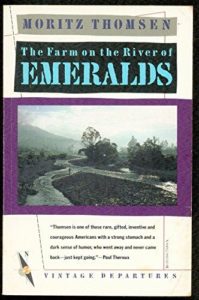Review — THE FARM ON THE RIVER OF EMERALDS by Moritz Thomsen (Ecuador)
The Farm on the River of Emeralds
by Moritz Thomsen (Ecuador 1965-67)
Vintage Departuers
344 pages
July 1989
$9.99 (paperback)
Reviewed by Mark D. Walker (Guatemala 1971-73)
•
While perusing my favorite books above my desk today, I realized that I’d never reviewed a book of my favorite Returned Peace Corps Volunteer, Moritz Thomsen. He is best known for Living Poor, published in 1969, which is rated as one of the best Returned Peace Corps Volunteer memoirs of all time. My personal favorite is The Farm on the River of Emeralds, the sequel, which tells a tale of endless reverses as a part owner of a farm on the northwestern coast of Ecuador—close to a hot, muggy, dirty, fishing village. The author struggles with his much younger, semi-literate black Ecuadorian partner, Ramon, and his wife Esther, battling nature, history and tradition in his efforts to develop a tropical farm in accordance with fair play and racial equality.
The author was a modest man, a farmer who considered that his passions centered around farming. He was honest to a fault, a brilliant story teller. He used simple language and had a speaking voice that was both grave and humorous. His writing could be morbid and ghoulishly humorous.
He describes the impact of his hatred for his father – a domineering man who condemned him for joining those “communists” at the Peace Corps – in this book, as well as the others he’s authored over the years. His anger, fear and pain become apparent throughout the book.
He was unique in several ways. He joined the Peace Corps at 53, dropping out of the privileged society he’d known in Seattle, to return to the jungles of Ecuador. And, he stayed around– twenty years after his Peace Corps experience. He was committed to the place and the local population he got to know as a Peace Corps Volunteer. He put down roots, which allowed him to immerse himself in the local culture and economy and understand its dynamics like few other ex-pats. This allowed him to enter the skin and psyche of his neighbors and describe their passions and ignorance with immense candor. As fellow Returned Peace Corps Volunteer and author, Paul Theroux, puts it, “Thomsen is one those rare, gifted, inventive and courageous Americans with a strong stomach and a dark sense of humor, who went away and never came back—just kept going.”
Thomsen’s unique worldview is reflected in this statement: “Living poor is like being sentenced to exist in a stormy sea in a battered canoe, requiring all your strength simply to keep afloat; there is never any question of reaching a destination. True poverty is a state of perpetual crisis, and one wave just a little bigger, or coming from an unexpected direction, can, and usually does, wreck things.”
As a volunteer who also returned to my host country to carry on my work, I can appreciate the important lessons Moritz teaches about the limitations of imposing one’s will on a society that rejects much of what we teach and is unwilling or unable to make the changes we promote. His actions reflect a humility and the value of appreciating one’s limitations as agents of change.
Although Moritz didn’t marry into his host country’s society, as I and many other Returned Peace Corps volunteers did, he held a very special place in Ecuador. A younger generation of Ecuadorian writers found Moritz’s works worthy of rediscovery and celebration, and along with ex-pat writers, staged an International Conference to honor Moritz in Quito. According to fellow Returned Peace Corps Volunteer, author and friend, Tom Miller, the “conference filled large tables in Quito restaurants with foreigners and locals, energized by his analysis and pending posthumous works.” (At least one more manuscript is still out there and unpublished…) The city of Quito posthumously named him an honorary citizen, and eventually a street was named in his memory.
Since 1992, the Peace Corps Writers Group awards an annual prize known as the Moritz Thomsen Peace Corps Experience Award. Several scholarly studies affirm and confirm the idea, widespread among a broad group of readers, that Moritz Thomsen is one of the most important, but least known, of the second part of the twentieth century American writers.
In 1991, he died of cholera, a poor man’s disease, in Guayaquil. He didn’t leave a will so the distribution of his limited possessions was complicated, especially the control over his writing. Yet his influence on authors—both Returned Peace Corps Volunteers as well as Ecuadorians – continues to this day.
•
As a Peace Corps Volunteer, Mark Walker (Guatemala 1971-73) implemented fertilizer experiments in Guatemala and Honduras, although his most important accomplishment was his marriage to his wife, and their three children, all born in Guatemala.
Following earning an MA in Latin American Studies from the University of Texas in Austin, Mark co-founded a Guatemalan development agency and then managed child sponsorship programs for Plan International in Guatemala, Colombia and Sierra Leone. He has held senior fundraising positions for several groups like CARE International, MAP International, Make A Wish International, and was the CEO of Hagar. Most recently, he completed a fundraising study for the National Peace Corps Association as a VP at Carlton & Co.
His involvement promoting “World Community Service” programs led to his receiving the most prestigious Service Above Self Award from the Rotary International Foundation, and all three of his children have participated in Rotary’s Youth Exchange program. His memoir, Different Latitudes: My Life in the Peace Corps and Beyond” won Honorable Mention in the Arizona Literary Award competition. He’s published various articles, including one in the summer issue of “Advancing Philanthropy.” Mark and his wife, Ligia, live in Scottsdale, Arizona close to their three children and seven grandchildren.

No comments yet.
Add your comment